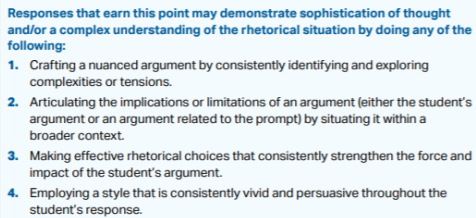|
I am creating this post purely to avoid scoring my AP Literature mock exams. (I'm sure you can relate). I don't know what it is about AP Literature versus AP Language, but I struggle so much more trying to wrap my head around the content. The abstraction of literature is something that has never truly enticed me, so navigating that prep is a challenge to say the least. (More on that eventually...) For today's part of the series, I wanted to talk about the concept of the "I Check." In my past post, I talked about the "I Learn" which is the first stage in the personalized process. In that stage, students explore the content and provide evidence of their learning.
|
| Prompt: | Student Handout: |
Mastery
If that makes sense...
Feedback
One of the biggest fears people have with personalizing learning is that students are going to be handing things in at all different times. While on the surface, this might seem frustrating or hard to organize, I feel it makes my feedback better. I score without the fatigue of reading 50 of a single assignment. Instead, I look at a variety of things all the time.
Also, and this is HUGE, I grade RIGHT. IN. CLASS. That means, I try to avoid grading outside of class. Why? Because if the student is in the room when I am scoring I can either A) score with them sitting beside me or B) pose questions to clarify meaning and help them correct.
I promise you. Personalizing - though admittedly a lot of work upfront - is a dream once you get going. These conversations about feedback (instead of notes on a paper) have been so much more impactful in getting students moving in the right direction.
In fact... My goal next year is to grade EVERYthing in class, all the time. If it's worth doing, it's worth taking the time to sit with the kids and score. Fortunately, using a personalized flexible format, gives me the time to make that happen!
Upcoming Posts
- Guiding Students Through Performance Task Design ("I Show")
- Teaching Reflection (...if I even figure it out).
(And if you are wondering, I did finish those mock exams... Until I got the makeup ones today).
Leave a Reply.
Archives
February 2024
January 2024
October 2023
July 2023
June 2023
February 2023
January 2023
December 2022
July 2022
June 2022
May 2022
February 2022
January 2022
December 2021
November 2021
October 2021
September 2021
August 2021
July 2021
June 2021
April 2021
March 2021
February 2021
January 2021
November 2020
October 2020
September 2020
August 2020
July 2020
June 2020
April 2020
March 2020
February 2020
January 2020
November 2019
August 2019
April 2019
March 2019
February 2019
January 2019
December 2018
November 2018
October 2018
September 2018
August 2018
July 2018
June 2018
May 2018
March 2018
Author
Steph Cwikla has been a teacher since 2012, focusing on ELA curriculum. Now, she also works as an instructional coach, helping other teachers improve engagement and instruction.

 RSS Feed
RSS Feed